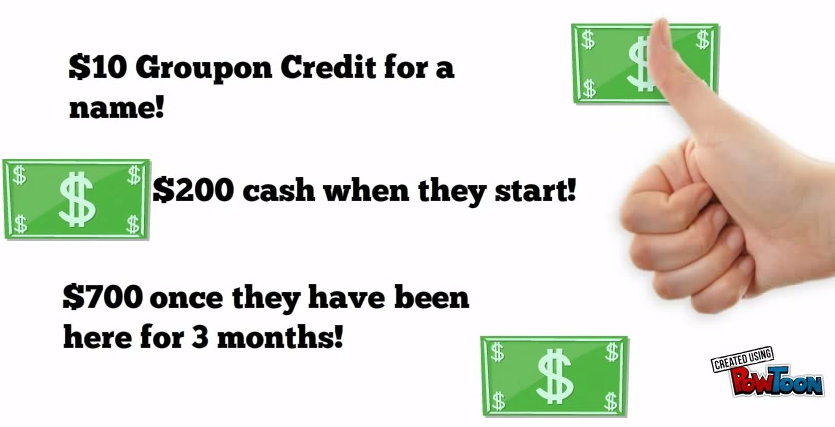Are employee referral bonuses worth it?
Employee referral bonuses can be an effective tool for incentivizing employees to refer potential candidates. However, the effectiveness of such bonuses can vary, with some companies finding non-financial incentives equally, if not more, effective.

Can an employee referral bonus make a difference in your employee referral program? It’d be great if employees were always happy to help. But, most companies think that incentives are necessary.
There are many different types of employee referral bonuses. They’re usually offered as cash, ranging from $1,000 to $3,000, sometimes reaching up to $10,000 in the tech industry. They can also include trips, gifts, vouchers, time off or other forms of reward.
Contents
Types of employee referral bonuses
Sometimes though, companies offer unique rewards. Here are two notable examples:
- Thoughtspot announced their exceptionally high $20,000 employee referral bonus in 2014. Employees and ‘friends of the company’ can win the reward. Their bold move made an impact and brought in three big hires in the first few months after its launch.
- Raizlabs, the mobile development company, offers a fun referral program: referrers get a 4-day, 3-night trip to one of four destinations:

What constitutes an employee referral bonus
The majority of companies offer cash. But, no matter what the reward is, most referral programs are similar in a few ways:
Companies pay out only if referred candidates are hired (or if they get an interview)
Most often, referred candidates have to work for the company for more than a couple of months before referrers get their full incentive. According to a 2014 WorldatWork survey, 71 percent of companies paid their employee referral bonus in full after an employment period between 45 days and six months.
Sometimes though, companies opt for splitting their payouts into parts. For example, for a total bonus of $1,000, referrers could receive $200 if their candidate gets an interview, $300 more if they’re hired and the remaining $500 if their candidate stays for more than three months. This ‘tiered’ reward system can work with non-monetary rewards too. For example, Groupon mentions a tiered system in their employee referral program video:

Companies won’t pay referrers who referred contract or temporary employees
Usually, only referring permanent employees (whether full-time or part-time) count for referral bonus programs.
Executives and HR employees aren’t usually allowed to receive a referral bonus
This is a common stipulation because executives and HR team members have control over who gets hired.
Referred candidates should be brand ‘new’
This means that referred candidates should have had no other contact with the company before they’re referred (e.g. former applicants don’t qualify).
Should employee referral bonuses be cash?
Money is always important. But, does it really help you get more or better referrals? Google’s attempt to double its bonus (from $2,000 to $4,000) fell flat. Conversely, domain registrar company GoDaddy saw an increase in referrals after cutting its bonus by two-thirds. A lot of the time, non-financial incentives can work just as well as financial ones. Sometimes, even better.
Should companies care about other companies’ incentives?
Some companies don’t restrict their incentive programs to their own employees. They sometimes allow their external network to refer candidates (like Raizlab’s ‘friends of the company’ program). If you find external referrals work for your company, you could aim to offer better incentives than other companies to direct more external referrals to your program. That is, unless you have a really strong employer brand and people know that you’re a great place to work.
Comparisons between companies mightn’t matter as much as employees’ engagement levels. Actively disengaged employees aren’t likely to bother with referrals. Engaged employees on the other hand, don’t just refer candidates for the promise of a reward. They like their workplace and want to share that experience. For those employees who fall somewhere in between, incentives can prove useful. But, in the end, it all comes down to whether employees like their company enough to refer someone.
Can no bonus be effective?
According to author and talent management advisor Dr. John Sullivan, companies can get valuable referrals without offering bonuses. He cites the example of Edward Jones, an investment company that boosted its referrals by 55 percent without offering a bonus incentive.
How could that happen? Engaged employees probably want to refer candidates without waiting for bonuses. A good approach is to emphasize how referrals make the workplace better. Remind employees that, by referring someone great, they’ll get a chance to work with them. And if they’re hired, they’ll bring benefits to the company as a whole. LinkedIn achieved a 17 percent boost to its referrals rates by creating a unique referral program called Talent X. They used their own product’s referral platform to make the process easier.
Google also showed that money doesn’t matter much when it comes to referrals. Doubling its bonus didn’t help boost referral rates. Even making the referral process more pleasant didn’t motivate employees to refer more. Eventually, Google managed to boost referrals by using the ‘aided recall’ technique. With aided recall, recruiters don’t send generic email requesting referrals. Instead, they ask specific questions like “who’s the best salesperson you know?” or they sit down with employees to look through their online networks with open roles in mind.
So, rewards don’t seem to make that big a difference. An easy process, with just a few clicks and no forms to fill, matters. As does employee engagement.
So, should companies drop employee referral incentives?
Employee referral incentives can be useful if used correctly. For example, building tiered reward systems or offering higher rewards for harder to fill positions can motivate employees to make more quality referrals.
But, spending too much time on finding the perfect incentive has a downside. If referrals become excessive, they might harm your productivity in the long term. This is because people tend to refer people who are similar to them. This kind of homogeneity can damage companies. Relying on referrals too much robs companies of the long-term performance gains of diverse teams.
Companies can still harness the power of referrals, but only up to a point. You don’t have to look for a newsworthy employee referral bonus. After all, incentives are only a small part of a successful referral program.
Frequently asked questions
- What is a typical referral bonus?
- The cash value of referral bonuses ranges from about $250 for entry-level positions to $25,000 for executive roles. The average employee referral bonus amount ranges from $1,000 to $5,000.
- How does an employee referral bonus work?
- A referral bonus is an incentive that motivates employees to recruit candidates from within their networks. It is often a part of a more robust employee referral program. The referral bonus is often granted once the employee is hired and remains at the company for a predetermined amount of time.
- What is a good employee referral percentage?
- The commission that is paid to recruiting companies is a direct expense to your company, so you want to find a balance that works well for your business model. You might easily pay the recruiting agency 20-30% of yearly employee compensation, but a referral incentive just requires 2-3% of annual employee pay.




